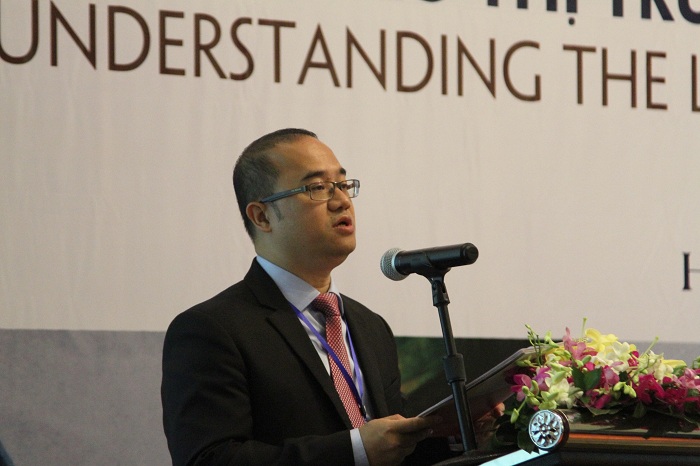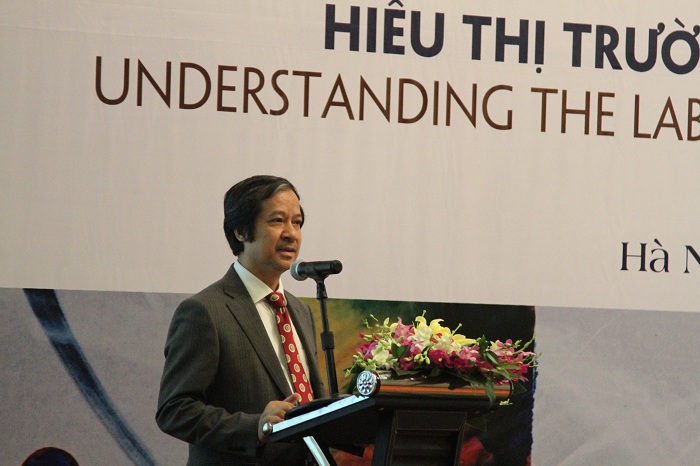Launching conference of Vietnam Annual Economic Report 2018
On 8th May 2018, Vietnam Institute for Economic and Policy Research, VNU University of Economics and Business in collaboration with Friedrich Naumann Foundation (FNF) held the launching conference of Vietnam Annual Economic Report 2018.
Attending the conference, from Vietnam National University, there were Assoc.Prof.Dr. Nguyen Kim Son - VNU’s President, Assoc.Prof.Dr. Nguyen Truc Le - Rector of VNU University of Economics and Business, Assoc.Prof.Dr. Nguyen Anh Thu - Vice Rector of VNU University of Economics and Business, Assoc.Prof.Dr. Nguyen Duc Thanh - Director of Vietnam Institute of Economic and Policy Research. From FNF, there was Mr. Mark Stanitzki - National Director of FNF Vietnam. From review group, there were Assoc.Prof.Dr. Vu Minh Khuong - Lee Kuan Yew School of Public Policy, Singapore; Assoc.Prof.Dr. Nguyen Thi Lan Huong - Former Director of Institute of Labor Science and Social Affairs, Dr. Nguyen Anh Tuan - Director of Institute of Vietnam Productivity together with prestigious experts and managers.

Overview of the conference
On his opening speech, Assoc.Prof.Dr. Nguyen Truc Le clearly stated that: High quality research and training are among the top priorities of VNU University of Economics and Business. In addition to the quality of training, practical application of research is an important aspect contributing to academic reputation of the University. The UEB has formed and developed 12 research groups, including 4 strong research groups at VNU’s level, among which is the strong research group on "Vietnam macroeconomic theory and policies in the context of international integration" with the key researchers from VEPR. Over the past 10 years, the group has constantly conducted researches with practical applicability, including Vietnam Annual Economic Report. On behalf of VNU University of Economics and Business, I express my sincere appreciation to scholars, partners and sponsors of the research project over the years.”
Next, Assoc.Prof.Dr. Nguyen Kim Son - President of Vietnam National University, Hanoi delivered the speech congratulating the conference as well as praising constant efforts of the authors in conducting such a valuable research.

Rector of the UEB - Assoc.Prof.Dr. Nguyen Truc Le gives opening speech at the conference

President of VNU - Assoc.Prof.Dr. Nguyen Kim Son delivers speech

Speech of Mr. Mark Stanitzki
On behalf of the authors, Assoc.Prof.Dr. Nguyen Duc Thanh presented the summary of Vietnam Annual Economic Report 2018.
Assoc.Prof.Dr. Nguyen Duc Thanh presents Vietnam Annual Economic Report 2018
Vietnam Annual Economic Report 2018, entitled “Understanding the Labor Market for Productivity Enhancement” focuses on Vietnam’s productivity in the international context, which highlights the need of understanding the labor market to explain the quality of human resources and productivity in Vietnam. Therefore, in addition to the overview on the world economy and Vietnam economy, the report presents in-depth study on the labor market and productivity of Vietnam, situation and motivations of the participation in programs to send Vietnamese laborers abroad.
The Vietnam Annual Economic Report 2018 consists of seven chapters and two appendices.
Chapter 1, entitled “Overview of the World Economy in 2017”, provides an overview of the world economy in 2017 with positive factors such as (i) strong growth in most countries; (ii) the recovery in global trade with fewer trade-restrictive measures; (iii) fastest pace of expansion of global manufacturing production since 2011; and (iv) political stability in EU countries. Nevertheless, the world economy still faced a number of unpredictable elements which had strong influences on global FDI flows in 2017 like the Brexit negotiation, the US withdrawal from global commitments; the increase of populism and protectionism in many countries; tensions and conflict escalate amongst countries like in Syria, etc.
Review from Assoc.Prof.Dr. Vu Minh Khuong
Chapter 2, entitled “Overview of the Vietnamese Economy in 2017”, provides a general view and assessment on the Vietnamese economy in 2017. Along with the global trend, Vietnam also witnessed a significant economic rebound. The industrial and construction sectors, particularly the manufacturing industry, continued to be the main driving force of economic growth. Inflation was kept relatively low due to prudent money supply control by the SBV. Macroeconomic stability, along with institutional reforms aimed at improving the investment climate, is expected to continue to be effective and more supportive for business activities in 2018. However, many inherent problems which have not been resolved thoroughly would remain a drag on the economy.
Review from Assoc.Prof.Dr. Nguyen Thi Lan Huong
Chapter 3, “Characteristics of Vietnam’s labor productivity in the process of international integration”, reviews Vietnam’s labor productivity at the whole economy level and sectoral level over time, as well as compares Vietnam with East Asian countries (Japan, Korea and China) and ASEAN. The result shows that Vietnam’s productivity is among the lowest in the region, even lower than Cambodia. In particular, industries having the lowest productivity include “manufacturing”, “constructing”, and “logistics”, expressing concerns about domestic production capacity. In addition, in the last decade Vietnam’s productivity has been mostly improved by structural shifts. Thus, the flexibility of the labor market is highly important, yet has not been paid much attention.
Comments of economist - Pham Chi Lan
Chapter 4, entitled “The increase in wages and labor productivity in Vietnam”, investigates the current minimum wage policy in Vietnam, the relationship between minimum wage, average wage, and labor productivity; as well as the impacts of continuous adjustments in minimum wage on the economy. Empirical studies suggest that the excess real wage growth could be resulted from the rapid increase in minimum wage. In addition, it is found that such increase in minimum wage generally results in a reduction in employment (growth) and firm profits.
There are, however, considerable differences in the effects across types of ownership, reflecting the differences in the extent of labor market regulations and enterprises’ technological and financial abilities to deal with rising labor costs. Generally, private enterprises tend to reduce formal labor contracts (who has insurance benefits) to cope with the increase in minimum wage (informalization). We also find evidence of mechanization among firms operating in labor-intensive manufacturing industries.
Chapter 5, entitled “Labor market participation and occupational choices of Vietnamese youth”, uses two sets of nationally representative data including the Labor Force Survey 2007-2016 and the transition from school to work in 2012 & 2015 to describes the real status, trends in labor market participation, employment and factors influencing labor market participation and occupational choice of young workers in Viet Nam. The study finds that a large proportion of the youth are working in the informal sector or other sectors not relevant to skills trained, thus do not have opportunities to accumulate skills. They also tend to receive less social insurance. This shows the risks and constraints for productivity growth. Moreover, job search through personal relations rather than professional intermediaries evidences an incomplete labor market. As a result, policies to promote employment seem to be less effective.
Chapter 6, entitled “Productivity enhancement through international labor market integration”, reviews the motivations of the participations in the programs to send Vietnamese laborers abroad, particularly the case of Vietnam-Japan internship. The study shows that there have been many problems that hinder the spillover of labor productivity gains. One of the major problems is the lack of transparency and information sharing in the market. In addition, the incomplete market structure also leads to high administration cost, putting financial pressures on the interns and making the spillover effect of productivity gains for Vietnamese laborers in foreign countries still low.
Assoc.Prof.Dr. Nguyen Truc Le (left) chairs the conference
As a conclusion, Chapter 7 on “Viet Nam’s Economic Prospects in 2018 and Policy Implications” provides two scenarios of the Viet Nam’s macroeconomic prospects in 2018 and detailed discussions on the current short-term policies. Economic growth would have high possibility to reach 6.83% in 2018, with an inflation rate of 4.21%. In a more unfavorable scenario, the growth rate would only be 6.49%, while inflation would be relatively stable at 3.86%.
In the long run, improving productivity would be central to all the reform policies. Particularly speaking for the labor market, more efforts are needed to make the market more efficient, in order to help labor be reallocated more rapidly and encouraged to accumulate more skills and improve productivity faster.
The report received high appreciation from review group and participants. Besides, experts also recommended some issues to be clarified such as movement of labor structure, minimum wage and wage policies for the labor market, factors affecting the increase of productivity.
Ending the conference, Assoc.Prof.Dr. Nguyen Truc Le summarized the comments from experts and participants and expressed appreciation for the contribution in finalizing the report.
The launching conference of Vietnam Annual Economic Report 2018 was sponsored by Friedrich Naumann Foundation (FNF) Vietnam. This year, the report was edited by Assoc.Prof.Dr. Nguyen Duc Thanh and Prof. Ohno Kenechi (Japan). The information and data was updated to December 2017, some key issues was updated to the first quarter of 2018. The full version in Vietnamese is expected to publish in September 2018. The English version will be published at the end of December 2018. |